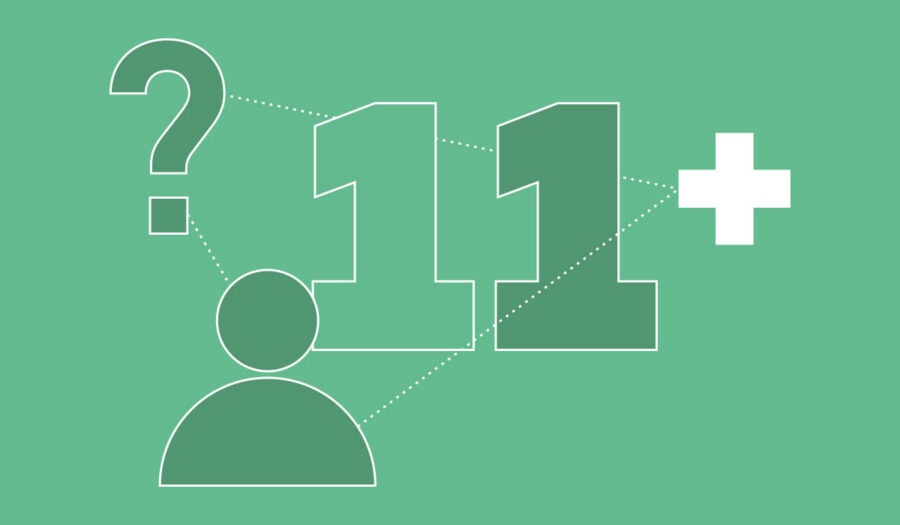It is normal for parents to have queries about the 11 Plus exam, we have compiled the most frequently asked questions (FAQs) for everyone in need of the information.
The 11 Plus exam, also known as the Eleven Plus or 11+ exam, is a selective entrance examination that is used in some areas of the United Kingdom to determine which secondary schools students will attend.
The exam is usually taken by students in their final year of primary education when they are around 11 years old.
The purpose of the exam is to identify the most academically able students and place them in the most suitable schools for their needs and abilities.
Origins of the 11 Plus
The 11 Plus exam was introduced in the 1940s as a means of providing a more merit-based system of education, with the goal of creating a more equitable and fair system for all students.
It was intended to replace the traditional system of grammar schools, which were seen as elitist and exclusive, with a more inclusive and merit-based system that would give all students the opportunity to succeed.
The various sections of the 11 Plus exam
The exam itself consists of a series of tests that are designed to measure a student’s academic ability, including Verbal Reasoning, Non-verbal Reasoning, English, and Mathematics.
- Verbal Reasoning: This test measures a student’s ability to understand and manipulate language. It typically consists of a series of questions that ask the student to identify relationships between words or to complete a series of sentences or paragraphs based on a given set of instructions.
- Non-verbal Reasoning: This test measures a student’s ability to understand and analyze visual information. It typically consists of a series of questions that ask the student to identify patterns, relationships, or logical sequences based on diagrams, charts, or other visual materials.
- Mathematics: This test measures a student’s mathematical ability and typically consists of a series of questions that cover topics such as arithmetic, algebra, geometry, and data analysis.
- English: This test measures a student’s reading and writing skills and typically consists of questions that ask the student to read a passage of text and answer questions about it, or to write an essay or other written response.
It is worth noting that the specific tests included in the 11 Plus exam can vary depending on the local education authority administering it and the specific school the student is applying to attend.
Some schools may also include additional tests or assessments as part of their admissions process.
The tests are typically administered by the local education authority and are held in the student’s primary school.
The results of the exam are used to determine which secondary schools the student will be eligible to attend, with the most academically able students typically being offered places at the most prestigious and selective schools.
Criticism surrounding the exam
In recent years, there has been some controversy surrounding the 11 Plus exam and its role in the education system.
Some argue that the exam is outdated and does not accurately reflect a student’s potential or ability.
Others claim that the exam is elitist and unfairly advantages students from certain socio-economic backgrounds, leading to a lack of diversity in the top schools.
There have also been concerns raised about the high levels of stress and anxiety that the exam can cause for students and their families.
Despite these criticisms, the 11 Plus exam remains an important part of the education system in many areas of the UK.
It is seen as a way of identifying the most academically able students and providing them with the best opportunities for success.
While there is an ongoing debate about the merits and drawbacks of the exam, it is clear that it continues to play a significant role in the education system and will likely continue to do so for the foreseeable future.
FAQs
What is the 11 Plus exam?
The 11 Plus exam is a selective entrance examination that is used in some areas of the United Kingdom to determine which secondary schools students will attend. The exam is usually taken by students in their final year of primary education when they are around 11 years old. It consists of a series of tests that are designed to measure a student’s academic ability, including Verbal Reasoning, Non-verbal Reasoning, and Mathematics.
Why is the 11 Plus exam administered?
The purpose of the 11 Plus exam is to identify the most academically able students and place them in the most suitable schools for their needs and abilities. It was introduced in the 1940s as a means of providing a more merit-based system of education, with the goal of creating a more equitable and fair system for all students. It was intended to replace the traditional system of grammar schools, which were seen as elitist and exclusive, with a more inclusive and merit-based system.
Who is eligible to take the 11 Plus exam?
The 11 Plus exam is typically taken by students in their final year of primary education when they are around 11 years old. It is administered by the local education authority and is typically held in the student’s primary school. All students in the relevant age range are eligible to take the exam, regardless of their socioeconomic background or previous academic achievement.
How is the 11 Plus exam graded?
The 11 Plus exam is graded on a pass/fail basis, with students who score above a certain threshold being deemed “passes” and those who score below it being deemed “failures.” The exact grading criteria vary depending on the specific test and the local education authority administering it.
What happens if a student fails the 11 Plus exam?
If a student fails the 11 Plus exam, they will typically be eligible to attend their local secondary school or a nearby non-selective school. These schools are generally less academically rigorous than the selective schools that students who pass the exam are eligible to attend.
Are there any exceptions to the 11 Plus exam rule?
In some cases, students may be exempt from taking the 11 Plus exam if they have a specific learning difficulty or disability that would make it difficult for them to complete the tests. Students who are eligible for this exemption will typically be placed in a suitable school based on their individual needs and abilities.
How can students prepare for the 11 Plus exam?
There are a number of ways that students can prepare for the 11 Plus exam, including:
- Practising sample test questions: Many local education authorities provide sample test questions that students can use to familiarize themselves with the types of questions they will encounter on the exam.
- Enrolling in a preparation course: Some private companies offer intensive preparation courses that are designed to help students develop the skills and knowledge they need to succeed on the 11 Plus exam.
- Working with a tutor: Students can also work with a private tutor to receive one-on-one instruction and support in preparing for the exam.
- Staying organized and staying on top of schoolwork: Good study habits and staying up-to-date with schoolwork can also help students prepare for the 11 Plus exam.
Is private tuition effective for 11 Plus preparation?
Private tuition can potentially be effective for preparing for the 11 Plus exam, as it allows students to receive one-on-one instruction and support from a qualified tutor.
A good tutor can help students understand the material they need to know for the exam, provide personalized feedback and guidance, and address any areas of weakness or confusion.
However, it is important to note that private tuition is not a guarantee of success on the 11 Plus exam.
The effectiveness of private tuition will depend on a variety of factors, including the quality of the tutor, the student’s own motivation and dedication, and the amount of time and effort the student puts into their studies.



